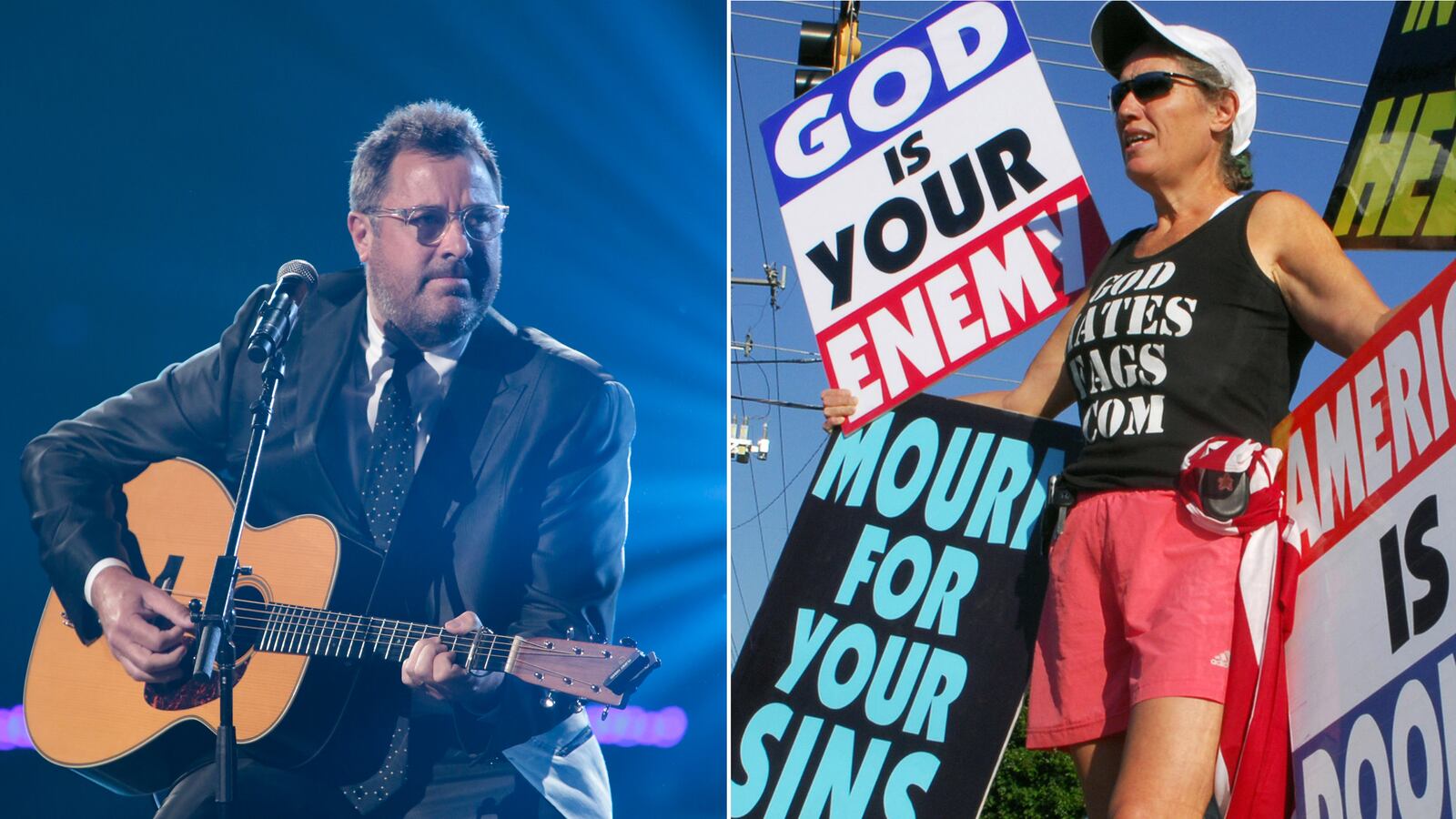Vince Gill did something on Sunday that not many country singers are willing to do: he courted controversy. Prior to a concert in Kansas City, Missouri, Gill confronted protesters from the Westboro Baptist Church of Topeka, Kansas, who were picketing outside his concert to protest his divorce and remarriage, which they hold to be nothing more than a form of adultery. The church, which is nonaffiliated, has also protested against gays and Jews and at the funerals of U.S. soldiers killed in combat, in the belief that God is punishing the nation for its immorality.

At Kansas City’s Kauffman Center for the Arts, Gill walked up to the picket line where people carried placards saying, “God Is America’s Terror.”
“Vince Gill, what in the world are you doing out here?” a woman on the line asked.
“I just came to see what hate looked like,” he said.
“Well, more importantly,” the woman said, “what are you doing with another man’s wife?”
“I came out to see what hatred really looked like in the face.”
“Don’t you know that divorce plus remarriage equals adultery?” the woman asked. “Jesus Christ said that.”
“Did he?” Gill responded. “You know what else he said? He said a lot of stuff about forgiveness, about grace. You guys don’t have any of that.”
But the only thing truly surprising about the encounter was that it happened at all.
Country musicians have been a pretty quiet bunch since 2003, when the Dixie Chicks started a ruckus by badmouthing George W. Bush 10 days before the invasion of Iraq (“We don't want this war, this violence,” lead vocalist Natalie Maines told a London audience, “and we're ashamed that the president of the United States is from Texas"). Conservative talk show hosts skewered the group, fans threw out their albums in public protest, album sales tanked, and the band played to half-empty halls for a few months.
Aside from the occasional and toothless “I’m a Patriot” tune from the occasional country star, it’s been pretty quiet since the Dixie Chicks debacle, unless you count Brad Paisley’s milquetoast bid for racial healing back in the spring when he performed a duet with LL Cool J on “Accidental Racist.” Defending his right to wear a Confederate flag T-shirt in a Starbucks (now there’s some real country imagery) because he was a Skynyrd fan, Paisley penned a song so sorry that its only redeeming aspect was that it inspired a withering parody by Stephen Colbert.
Oh, for the good old days when Roy Acuff taught Richard Nixon how to use a yo-yo on the stage of the Grand Ole Opry. The fact is, though, country music has always been averse to controversy. True, a few country performers turn out for the Republican convention now and then (Ted Nugent needs some company). But in the main country artists are far more timid about taking public stands than their counterparts in rock, pop, or hip hop.
Intriguingly, the country stars who do have something to say are usually to the left of center (Johnny Cash) or unpredictably contrarian (Merle Haggard).
Cash invited African-American performers onto his television show and always said that gospel singer Sister Rosetta Tharp was his favorite singer. He protested the Vietnam War in his music and sang “The Ballad of Ira Hayes,” about a Native- American war hero.
Haggard is a more complicated case. “Okie From Muskogee” made fun of hippies and extolled small-town virtues, but it did it with some tongue in cheek. “The Fighting Side of Me,” on the other hand, is a downright mean and divisive song. But what are we to make of “Irma Jackson,” Haggard’s beautiful song about an interracial love affair that he put on an album in 1972? Or of the fact that Haggard was a Hillary supporter and wrote a song endorsing her candidacy? No one with a lick of sense would ever try to predict where Merle’s going to land next.
Then there’s Willie Nelson, whose leadership of the Farm-Aid years makes him the hands-down favorite as most effective activist in a cowboy hat. In 28 years, the NGO he helped found and for which he still performs has raised more than $43 million to help preserve family farms.
Right-wing country stars have come forth now and then, although rarely with the virulence of, say, the ’60s, when Dave Dudley recorded “The Vietnam Blues,” and Marty Robbins recorded ”Ain’t I Right,” which knocked the Freedom Riders (“You bring a lot of trouble to the town and then you leave/ That's part of your Communistic game”). His label, Columbia, considered the song so nasty that it refused to release it—it only appeared years later on a collection of his music.
These, though, are all exceptions. For most of its history, country music has been a profoundly insular music that avoided tangling with social issues. Country songwriters may have been ahead of the curve when it came to dealing straightforwardly with domestic matters, such as divorce, drinking, cheating, and single parenthood, but they showed almost zero interest in civil rights, Vietnam, or women’s issues. “Stand by Your Man” is a rarity, not the rule.
More than almost any other form of music, country—and I’m talking about country before it got “cool” and started sounding like the Eagles—was music made for a specific audience: the white working class. Its defenders will point out that there were black performers like the harmonica player Deford Bailey on the Grand Ole Opry, but in fact, there was just Deford Bailey. Black country singers like Charley Pride? Nope, just Charley Pride. You have to dig way back to discover that early country was not all that different from the African-American music that was finding a national audience at the same time that the first country performers did, and that sometimes it was the same audience. Most certainly, country’s stars didn’t talk much about the fact that their music owed as much to the blues as it did to Anglo-Irish fiddle tunes brought over from Europe.
But how about this song, “Blue Yodel #9,” recorded in 1930 by Jimmie Rodgers, the undisputed Father of Country Music, with the help of Louis Armstrong and his wife, Lil, on piano. The most interesting thing about this number, as Noah Berlatsky has pointed out, is that neither Rodgers nor the Armstrongs sound the least bit uncomfortable. Unlike that dissonant duet between Brad Paisley and LL Cool J, no one here is trying to play a style they aren’t comfortable with, because it’s the same style. Armstrong’s jazz and Rodgers’s country are two sides of the same thing, whether you call it blues, or jazz, or country. The sad truth is that American musicians, black or white, were more in tune with each other’s music 80 years ago than they are today.
Country’s great mistake was to turn its back on its own roots in the blues and early jazz. Those strains surface now and again, in the swing of Bob Wills, and in many songs by Haggard and Nelson, but for the most part country shut itself off from where it had come from and from what was going on in other styles of music, not to mention the social movements that remade society in the last half of the 20th century. As a result, when country stars do try to start a dialogue about a loaded subject like race, it just sounds mealymouthed and confused. No wonder they avoid controversy.





